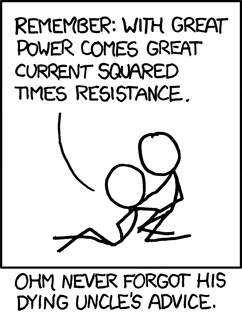643: Ohm
| Ohm |
 Title text: More generally, with great power comes great dEnergy/dt |
Explanation[edit]
This comic deliberately conflates the origin story of the comic-book superhero Spider-Man with the origin of Ohm's law, as both the origin story of Spider-Man and Ohm's law deal with power, though the power is of different types.
In the origin story of Spider-Man Peter Parker (who would become Spider-Man) is raised by his Aunt May and Uncle Ben. When Parker goes through various stages of teenage angst and rebellion, his Uncle Ben (in different situations depending on the comics and/or movie) advises him that "with great power comes great responsibility". Here, power is taken by the reader to refer to Parker's superhero powers, acquired from a bite from a radioactive spider and via various technologies Parker designs himself. It is to be noted, however, that Uncle Ben doesn't know about these powers in the origin stories and only means this as general advice.
In contrast, in this xkcd comic, Ohm's law is supposedly delivered to Georg Ohm by a similar authority figure in the form of relating current and resistance to power (in the unit of Watts), where power is defined as the change in energy per unit time. In real life, Ohm obviously was never "advised" about the law but instead determined experimentally that current through an Ohmic resistor was proportional to the voltage.
This relationship is summarized by Ohm's law:
- Voltage = Current x Resistance (V=IR)
Electric power is defined as:
- Power = Current x Voltage (P=VI - Joule's first law)
- which, by replacing "Voltage" with "(Current x Resistance)" (from Ohm's law):
- Power = Current x (Current x Resistance) = Current² x Resistance
- which leads to the power equation alluded to in the comic.
The joke here is that given the proportionality, by definition a great (amount of) power would involve a great (amount of) current and/or resistance (squared), as here the phrase 'great power' could be taken to mean 'a large capability to do things' or 'a numerically large quantity of (electrical) power'. There is also humor in the improbability of this scenario, the comparison with Spider-Man, as well as the suggestion that it was how Ohm derived his eponymous law.
The title text takes this further, by redefining the power equation as a more generalized differential equation, which simply states that power is proportional to the change of energy per unit time (dE/dt), which is another way of stating that "power = energy per unit time". In many engineering and physics books the differential form is presented as the general form from which a specific algebraic form can be derived as the differential form is more adaptable to special cases, and therefore more general, and so the title text extends the conflation of physical power and electrical power to a more generalized form.
Transcript[edit]
- [A Cueball-like guy (Georg Ohm) is kneeling behind and holding his Cueball-like uncle by the shoulders as he is lying down.]
- Uncle: Remember: With great power comes great current squared times resistance.
- [Caption below the frame:]
- Ohm never forgot his dying uncle's advice.
Trivia[edit]
- Funnily enough, the 2017 series depicts the quote as a pseudo-formula.[actual citation needed]
Discussion
"who determined that a given resistor would pass double the current..." -Actually, this is true only of ohmic resistors, which have constant resistance. Wire resistors, which I'm assuming are what Ohm used, are essentially ohmic for low voltage/current, but their resistance increases at high voltage because they give off dramatically more energy as heat. Other types of resistors have different behaviour. For example, semiconductors have low resistance in one direction and high resistance in the other. Probably someone should correct this! Sciepsilon (talk) 01:51, 1 December 2013 (UTC)
- Somebody really should not. 108.162.219.223 06:34, 24 December 2013 (UTC)
Funnily enough, the Dutch word for "Uncle" sounds similar to "Ohm", though it is spelled differently (Oom). 162.158.111.229 11:02, 6 May 2017 (UTC)
"... both the origin story of spider-man and Ohm's law deal with power". No, Ohm's law doesn't mention power at all. 108.162.250.29 09:30, 26 July 2017 (UTC)
What does the Trivia mean?? 2017 series of Spiderman comics presumably, but is Uncle Ben's quote, "With great..." a pseudo-formula? What would that imply? Potentially he claims responsibility is proportional to to power, such that his quote is "R = k dE/dT for a constant k," but if this is the correct interpretation it is not clear... R128 (talk) 15:12, 8 December 2025 (UTC)